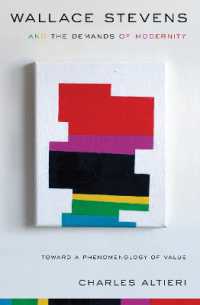- ホーム
- > 洋書
- > 英文書
- > Literary Criticism
Full Description
Much current theorizing about literature involves efforts to renew our sense of aesthetic values in reading. Such is the case with new formalism as well as recent appeals to the notion of "surface reading." While sympathetic to these efforts, Charles Altieri believes they ultimately fall short because too often they fail to account for the values that engage literary texts in the social world. In Reckoning with the Imagination, Altieri argues for a reconsideration of the Kantian tradition of Idealist ethics, which he believes can restore much of the power of the arguments for the role of aesthetics in art. Altieri finds a perspective for that restoration in a reading of Wittgenstein's later work that stresses Wittgenstein's parallel criticisms of the spirit of empiricism.
Altieri begins by offering a phenomenology of imagination, because we cannot fully honor art if we do not link it to a distinctive, socially productive force. That force emerges in two quite different but equally powerful realizations in his reading of John Ashbery's "Instruction Manual," which explicitly establishes a model for a postromantic view of imagination, and William Butler Yeats's "Leda and the Swan." He then turns to Wittgenstein with chapters on the role of display as critique of Enlightenment thinking, the honoring of qualities like sensitivity and the ability to attune to the actions of others, the role of expression in the building of models, and the contrast between ethical and confessional modes of judgment. Finally, Altieri produces his own model of aesthetic experience as participatory valuation and makes an extended argument for the social significance of appreciation as a way to escape the patterns of resentment fundamental to our current mode of politics. A masterful work by one of our foremost literary and philosophical theorists, Reckoning with the Imagination will breathe new life into ongoing debates over the value of aesthetic experience.
Contents
1. Why Wittgenstein Matters for Literary Theory
2. The Work Texts Do: Toward a Phenomenology of Imagining Imaginatively
3. Where Doubt Has No Purchase: The Roles of Display
4. The Concept of Expression in the Arts
5. Expression and Exemplification
6. What Literary Theory Can Learn from Wittgenstein's Silence about Ethics
7. Appreciating AppreciationNotes
Bibliography
Index








